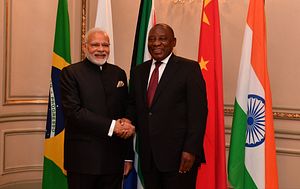This week will see South African President Cyril Ramaphosa gracing India’s Republic Day celebrations. These invitations to be the chief guest at India’s most high-profile public event carry high symbolic value as New Delhi sends out important strategic messages with the choice of its guests. Last year, the 10 leaders from the member states of the Association of Southeast Asian Nations (ASEAN) were the chief guests to reinforce India’s priorities in the region. Other guests have included key partners of India, such as former U.S. President Barack Obama, former French President Francois Hollande, and the Crown Prince of Abu Dhabi Sheikh Mohamed bin Zayed Al Nahyan. India had first invited U.S. President Donald Trump for this year, but the offer was declined by the White House because of “scheduling constraints.”
The invitation to Ramaphosa is important from many dimensions. Ramaphosa, who served as the deputy president of South Africa from 2014 to 2018, has a long-standing record as an anti-apartheid activist. Despite being Nelson Mandela’s preferred successor, the African National Congress (ANC) opted for his rival, Thabo Mbeki, as the second post-apartheid president. The decision to invite Ramaphosa also coincides with Mahatma Gandhi’s 150th birth anniversary; the South African leader is a keen Gandhi follower. In a first for a sitting president, Ramaphosa led the annual “Gandhi Walk” last year in Lenasia, an Indian township south of Johannesburg, in order to promote community awareness and fitness.
Ramaphosa took over as South Africa’s president after an embattled Jacob Zuma resigned with great reluctance in February 2018. Zuma had been blamed for widespread corruption in South Africa, even as he led the country for more than a third of its time after apartheid. His departure was difficult, but necessary as the corruption scandals kept on mounting and the South African economy went into a tailspin. The persistent claims of corruption at the heart of government remain one of the major problems facing South Africa. As a consequence, South Africa’s economic prospects remain uncertain in the lead up to the May elections this year even though the ANC is expected to win the elections. The ANC has benefited from Ramaphosa being at the helm of the party and the country, but the economy has not done as well as many were expecting when Ramaphosa took over, denting his popularity. For the ANC today, Ramaphosa remains its only asset, more popular than the party itself.
Ramaphosa will be visiting India, which itself has entered into election mode. But India’s ties with South Africa remain too important to be left to the vagaries of electoral politics. The Modi government has made Africa a foreign policy priority, with sustained high-level engagements with countries in the continent since May 2014. This has been an attempt to deal with the complaint of African nations that India’s interest in the continent remains episodic. As China’s economic engagement in the region comes under growing critical scrutiny, there are new opportunities for India to enhance its profile with a more equitable partnership with African countries.
Bilateral trade between India and South Africa presently stands at about $10 billion and the potential for growth is significant. The two countries have set a target of $20 billion for trade and investment to be reached by 2021. Some of India’s biggest corporations, such as Tata, Mahindra, and Vedanta, are among the 150 odd Indian companies that have invested in South Africa. New and emerging sectors like healthcare, technology, and skill development are going to be the focus during Ramaphosa’s visit. He is keen to take the relationship beyond traditional trade and investment areas to a more forward-looking economic agenda. The defense relationship, with a focus on joint production as well as maritime security, is also going to be a priority in the future.
Beyond the bilateral, the two nations are engaged in a number of plurilateral initiatives. These include not only the much talked about BRICS grouping along with Russia, Brazil, and China, but also the India-Brazil-South Africa trilateral, the Commonwealth, and the Indian Ocean Rim Association. The BRICS agenda needs to evolve in a manner that emphasizes the voices of New Delhi and Pretoria. It is for this reason, perhaps, that the IBSA, which involves three democracies — India, Brazil and South Africa — needs to be revived. The Commonwealth also needs a more proactive engagement from India and South Africa if its future is to be viable. Given the centrality of the Indian Ocean in emerging geopolitics and geoeconomics, IORA needs full support from India and South Africa too to strengthen its institutional underpinnings.
It is perhaps time for the two nations to think big and start having a conversation about the larger trends in global politics. As a new order evolves, two friends with a longstanding historical relationship should now start talking about the future of Asia and Africa. At a time when strategic geographies are getting redefined with the rise of Eurasia and the Indo-Pacific, key players like India and South Africa need to move beyond their comfort zones. It is to be hoped that Ramaphosa’s visit will be able to spur that conversation.

































